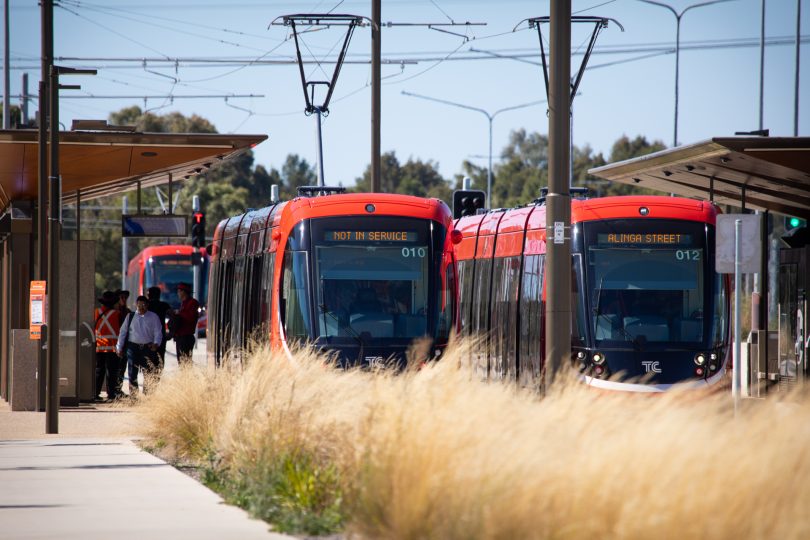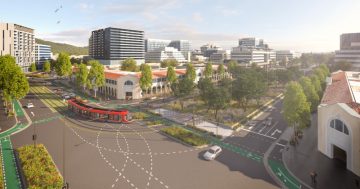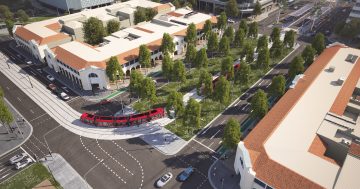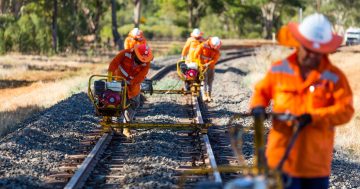
The ACT Government wants to give local suppliers a full, fair and reasonable opportunity to participate in the delivery of the next phase of the Canberra light rail project. Photo: Michelle Kroll.
Diverse Canberra suppliers will be the winners as the ACT Government encourages local tenders in the next phase of the Canberra light rail project.
Industry Capability Network (ICN) Canberra has been brought in to help engage local and diverse suppliers to contribute to the Stage 2A extension – a 1.7-km stretch of infrastructure from the existing terminus on Alinga Street to a new stop at Commonwealth Park.
The focus is part of the ACT Government’s industry participation plan, which sets minimum thresholds for engagement with suppliers from various demographics in major projects.
A spokesperson said the ACT Government has made a long-term commitment to support an inclusive and sustainable environment and culture for the local construction industry.
“The ACT Government embeds contractual commitments to uplift local and diverse participation on construction projects,” the spokesperson said.
Tenderers must make several submissions through the tendering process, including a Local Industry Participation Plan (LIPP) to outline their approach to contractual requirements and strategies to meet local industry, diversity and inclusion needs within the project’s supply chain. They must also demonstrate how they will ensure capable local businesses are given full, fair and reasonable opportunity to participate in the project’s delivery.
“The LIPP developed by delivery partner, Canberra Metro, aims to support a local and diverse workforce in the ACT, contributing to the local economy and the wellbeing of all Canberrans,” the spokesperson said.
Canberra Metro has also committed to achieving minimum representation levels of groups including apprentices, trainees, graduates, Aboriginal and/or Torres Strait Islanders, women in trades, senior leadership and management roles, people with a disability, young people not currently employed, education or training, mature age people, people from culturally and linguistically diverse backgrounds (CALD), LGBTIQA+ and sex and gender non-conforming people, carers and veterans.
Canberra Metro CEO Lachlan Marks said the organisation was committed to local business participation and employment on the Light Rail Stage 2A project.
“During construction of Stage 1 light rail more than 70 per cent of the project workforce came from Canberra and the surrounding region and more than 130 local businesses were involved in the project,” he said.
“Light Rail Stage 2A will also offer a wide range of opportunities for local Canberra businesses during construction.”
The project’s goods and services needs include concrete supply, civil works, fencing and barrier hire, waste management, signage, electrical services, reinforcing supply, traffic management, steel fabrication, plant and equipment hire.

ICN ACT business manager Louise Wakefield says having the next phase of the Canberra light rail project on Gateway by ICN gives a broader reach to diverse local suppliers. Photo: Thomas Lucraft.
The takeaway is that suppliers who may not have thought of themselves as contenders for this project should come forward and throw their hat in the ring, according to ICN ACT business manager Louise Wakefield.
“From ICN ACT’s perspective, we’re really pleased the government has factored this into major projects. Our whole remit is around small businesses having full, fair and reasonable access to these opportunities,” she said.
“ICN has all the networks needed to facilitate these small businesses stepping into the ring.”
Gateway – ICN’s extensive database of 90,000 Australian registered businesses – comes in particularly handy for suppliers in the ACT.
“Because we are a network, we have access to a wide range of companies with the capability and capacity to support major projects,” she said.
“By having the project on Gateway means there’s a communication channel for local suppliers to learn about the project and engage in the expression of interest processes they may not have otherwise thought were accessible to them. At the same time, our members can fill the gaps where local contractors can’t meet the required capacity or capability.
“We have 400 new businesses joining Gateway every month. There are new players all the time that may be able to supply services that weren’t available before. That introduces competition, which is good for everyone.”
Key features of Canberra’s light rail system include no overhead wiring, grassed sections along London Circuit and Commonwealth Avenue, and the raising of London Circuit to form an at-grade signalised intersection at Commonwealth Avenue.
This will include needed changes to the road network, kerb widening, land adjustments, traffic signalling, utilities relocation, drainage works between Alinga Street and Edinburgh Avenue, active travel improvement, integration of operations-related systems such as ticketing, information displays and CCTV, a new bridge and power substation.
“There’s a wide scope, and a lot of different areas businesses can participate in,” Ms Wakefield said.
“I encourage any business that isn’t already registered on Gateway by ICN to do so. It’s free and puts you in the mix for these exciting opportunities.”
More information on supply opportunities for the Light Rail Stage 2A project is available on the ICN Gateway website. An information forum on local supply opportunities will be held on Tuesday 3 September 2024 – email info@canberra-metro.com.au for more details and to register your attendance.




















